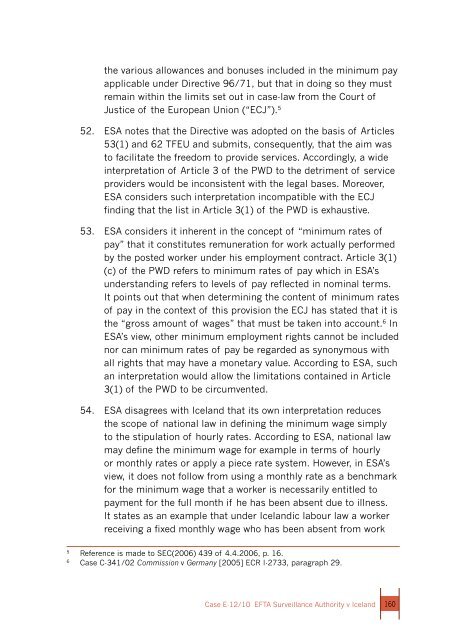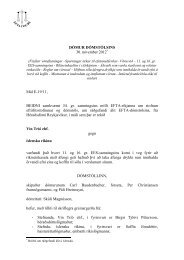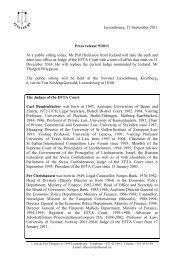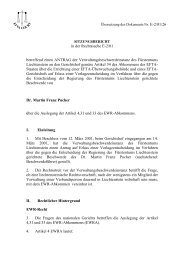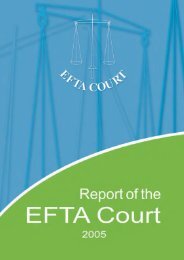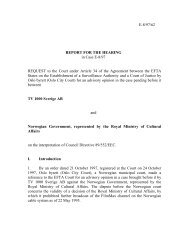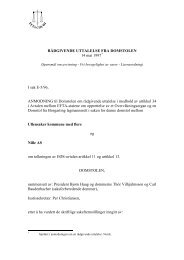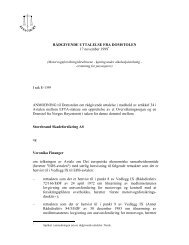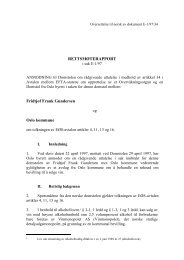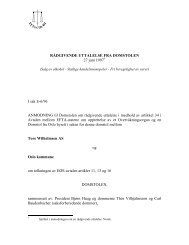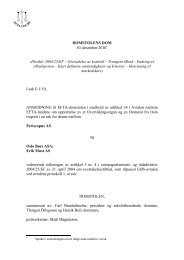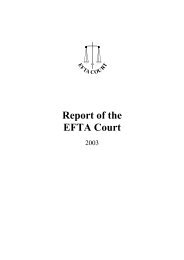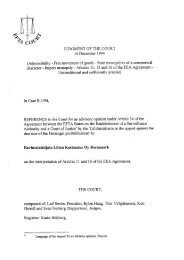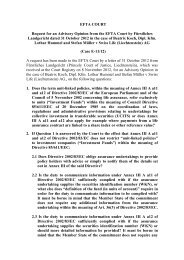- Page 1 and 2:
Summary Case e-xx/x RepoRt of the e
- Page 3 and 4:
RepoRt of the eFtA Court 2011 www.e
- Page 5 and 6:
The EFTA Court was set up under the
- Page 7 and 8:
Foreword I DECISIONS OF THE COURT C
- Page 9 and 10:
xxxxxxxxxxxxxxxxxxxxxxxxx Summary C
- Page 11 and 12:
I. Decisions of the Court xxxxxxxxx
- Page 13 and 14:
CASE E-13/10 Aleris Ungplan AS v EF
- Page 15 and 16:
ORDER OF THE COURT 31 January 2011
- Page 17 and 18:
2010) with the possibility of exten
- Page 19 and 20:
Any natural or legal person may, un
- Page 21 and 22:
19 ESA argues that the special rule
- Page 23 and 24:
Commission v Greece [2005] ECR I-47
- Page 25 and 26:
Joined Cases e-4/10, e-6/10 and e-7
- Page 27 and 28:
A measure by which the public autho
- Page 29 and 30:
10. The determination whether a mea
- Page 31 and 32:
for the reasoning to go into all th
- Page 33 and 34:
THE COURT, composed of: Carl Bauden
- Page 35 and 36:
II LEGAL BACkGROUND EEA law 5 Artic
- Page 37 and 38:
(iii) aid which is deemed to have b
- Page 39 and 40:
15 The coupon tax applies to compan
- Page 41 and 42:
were requested to explain the tax t
- Page 43 and 44:
ESA’s analysis, captive insurance
- Page 45 and 46:
2. The amount of aid to be recovere
- Page 47 and 48:
42 The reply from Reassur in Case E
- Page 49 and 50:
activity, regardless of the legal s
- Page 51 and 52:
the scheme at issue, without being
- Page 53 and 54:
selective. Moreover, according to t
- Page 55 and 56:
73 in this regard, it has to be exa
- Page 57 and 58:
Arguments of the parties 81 The app
- Page 59 and 60:
Cases Portugal v Commission, cited
- Page 61 and 62:
Findings of the Court 94 With regar
- Page 63 and 64:
103 Reassur and Swisscom submit tha
- Page 65 and 66:
may have had tax concessions before
- Page 67 and 68:
119 Accordingly, the question wheth
- Page 69 and 70:
final decision. Reassur asserts tha
- Page 71 and 72:
134 in ESA’s view, the publicatio
- Page 73 and 74:
Findings of the Court 141 The aboli
- Page 75 and 76:
it was already established at the t
- Page 77 and 78:
154 ESA, with the support of the Co
- Page 79 and 80:
163 in the case at hand, the situat
- Page 81 and 82:
easoning followed by ESA in such a
- Page 83 and 84:
Although these were not necessarily
- Page 85 and 86:
The third part of the fourth plea:
- Page 87 and 88:
have been aware by the date of publ
- Page 89 and 90:
REPORT FOR THE HEARING in joined Ca
- Page 91 and 92:
Tax Act. This decision was publishe
- Page 93 and 94:
2010. The Reply from Reassur in Cas
- Page 95 and 96:
21. Article 5 SCA reads as follows:
- Page 97 and 98:
that the EFTA State concerned shall
- Page 99 and 100:
28. Article 17 in Part ii of Protoc
- Page 101 and 102:
73, points a) to f), of the Act, am
- Page 103 and 104:
- Swisscom, represented by Dr Micha
- Page 105 and 106:
that ESA’s findings in this regar
- Page 107 and 108:
for certain undertakings in compari
- Page 109 and 110:
the Groepsrentebox 19 and Hungarian
- Page 111 and 112:
question were introduced in order t
- Page 113 and 114:
provisions qualify as “existing
- Page 115 and 116:
qualified as “existing aid” acc
- Page 117 and 118:
much lower standard of protection o
- Page 119 and 120: they were enacted until publication
- Page 121 and 122: 92. it is submitted that in cases w
- Page 123 and 124: effects. in the applicants’ view,
- Page 125 and 126: parties to whom it is of direct and
- Page 127 and 128: CASE E-12/10 EFTA Surveillance Auth
- Page 129 and 130: JUDGMENT OF THE COURT 28 June 2011
- Page 131 and 132: to at point 30 of Annex Xviii to th
- Page 133 and 134: (6) Whereas the transnationalizatio
- Page 135 and 136: undertakings and to the undertaking
- Page 137 and 138: No. 19/1979, Respecting Workers’
- Page 139 and 140: information concerning the terms an
- Page 141 and 142: ESA, the entitlement provided for i
- Page 143 and 144: a “social security benefit”. Th
- Page 145 and 146: The Commission 38 The Commission su
- Page 147 and 148: 44 The “minimum rates of pay, inc
- Page 149 and 150: insurance for their employees conce
- Page 151 and 152: Human Rights are important sources
- Page 153 and 154: REPORT FOR THE HEARING in Case E-12
- Page 155 and 156: II LEGAL BACkGROUND European law 6.
- Page 157 and 158: 2. Everyone residing and moving leg
- Page 159 and 160: circumstances, and exceeds 12 month
- Page 161 and 162: 7. Paragraphs 1 to 6 shall not prev
- Page 163 and 164: 31. Article 3 of the Posting Act -
- Page 165 and 166: If the undertaking so requests, the
- Page 167 and 168: to register and provide information
- Page 169: the Posting Act constitute minimum
- Page 173 and 174: encompass “minimum wages and othe
- Page 175 and 176: and accident” to be synonymous. A
- Page 177 and 178: 73. According to ESA, it follows th
- Page 179 and 180: 79. Furthermore, ESA submits that i
- Page 181 and 182: 87. Further, it seems to ESA that i
- Page 183 and 184: Relevant law 92. iceland cites a co
- Page 185 and 186: minimum protection set out in Artic
- Page 187 and 188: Regulation No 1408/71 and Article 5
- Page 189 and 190: ight as concerns the preservation o
- Page 191 and 192: purposes of preserving their value
- Page 193 and 194: 124. in addition, iceland also subm
- Page 195 and 196: sick leave is thus entitled to paid
- Page 197 and 198: Regulation No 1408/71 and Article 5
- Page 199 and 200: 1408/71 for the protection of worke
- Page 201 and 202: 150. The Kingdom of Norway argues,
- Page 203 and 204: 155. The Kingdom of Norway acknowle
- Page 205 and 206: deemed to fall within the scope of
- Page 207 and 208: 169. The Commission further submits
- Page 209 and 210: Directive 96/71 and Article 7 of th
- Page 211 and 212: Case e-18/10 EFTA Surveillance Auth
- Page 213 and 214: end of the period prescribed in the
- Page 215 and 216: having decided to dispense with the
- Page 217 and 218: men and women in occupational socia
- Page 219 and 220: 18 in its reply of 11 March 2010, t
- Page 221 and 222:
Court. Article 33 SCA corresponds i
- Page 223 and 224:
VI COSTS 33 Under Article 66(2) of
- Page 225 and 226:
Case e-4/11 Arnulf Clauder Case xxx
- Page 227 and 228:
RECHTSSACHE E-4/11 Arnulf Clauder (
- Page 229 and 230:
a, b oder c erfüllt, d. h. dass de
- Page 231 and 232:
URTEIL DES GERICHTSHOFS 26. Juli 20
- Page 233 and 234:
- der Regierung des Königreichs de
- Page 235 and 236:
3 Für eine ausführliche Darstellu
- Page 237 and 238:
2. „Familienangehöriger“ a) de
- Page 239 and 240:
das Recht, sich dort auf Dauer aufz
- Page 241 and 242:
13 im Jahr 2009 wurde die Ehe zwisc
- Page 243 and 244:
18 in seinem Antrag auf vorabentsch
- Page 245 and 246:
Familiennachzug selbst dann geltend
- Page 247 and 248:
Daueraufenthaltsrecht nicht mehr an
- Page 249 and 250:
2004/38 für EWR-Staatsangehörige
- Page 251 and 252:
den Artikeln 6 und 7 der Richtlinie
- Page 253 and 254:
Familienangehörige selbst die Bedi
- Page 255 and 256:
35 Der Gerichtshof stellt weiterhin
- Page 257 and 258:
sondern abgeleitete Rechte, die sie
- Page 259 and 260:
43 Nach dem Dafürhalten des Gerich
- Page 261 and 262:
46 Könnte ein EWR-Staatsangehörig
- Page 263 and 264:
ist. Nach ständiger Rechtsprechung
- Page 265 and 266:
Aus diesen Gründen erstellt DER GE
- Page 267 and 268:
SITZUNGSBERICHT in der Rechtssache
- Page 269 and 270:
II RECHTLICHER HINTERGRUND Europare
- Page 271 and 272:
6. Artikel 7 der Richtlinie - Recht
- Page 273 and 274:
8. Artikel 24 der Richtlinie - Glei
- Page 275 and 276:
11. Die Liechtenstein betreffenden
- Page 277 and 278:
anderen Mitgliedstaats zu verbleibe
- Page 279 and 280:
3) Die Kontrollfrist zur Überprüf
- Page 281 and 282:
16. Die in Artikel 41 Absatz 1 Buch
- Page 283 and 284:
19. im Jahr 2002, nach mehrfacher v
- Page 285 and 286:
24. Am 26. April 2010 erhob Herr Cl
- Page 287 and 288:
- die Regierung des Fürstentums Li
- Page 289 and 290:
lücke darstellt, sondern dass das
- Page 291 and 292:
von EWR-Staaten erfüllen müssen,
- Page 293 and 294:
ermittelt wird - die Kriterien, die
- Page 295 and 296:
38. Mit Blick auf den Erwerb eines
- Page 297 and 298:
invalidenversicherung 11 (ELG) abh
- Page 299 and 300:
Zur dritten Frage 42. Die Regierung
- Page 301 and 302:
Existenzmittel zur Bedingung zu mac
- Page 303 and 304:
tigten EU-Bürger nachziehen möcht
- Page 305 and 306:
Staat laut völkerrecht, vorbehaltl
- Page 307 and 308:
fünf Jahre lang ununterbrochen im
- Page 309 and 310:
56. Die EFTA-Überwachungsbehörde
- Page 311 and 312:
58. Die EFTA-Überwachungsbehörde
- Page 313 and 314:
60. Angesichts dieser Erwägungen v
- Page 315 and 316:
die EFTA-Überwachungsbehörde, das
- Page 317 and 318:
Arbeitnehmer oder Selbstständiger
- Page 319 and 320:
enthaltsberechtigten das Recht auf
- Page 321 and 322:
Familie nach einem fünfjährigen A
- Page 323 and 324:
mission erinnert daran, dass nach s
- Page 325 and 326:
Case e-14/10 Konkurrenten.no AS v E
- Page 327 and 328:
to the provisions of national law p
- Page 329 and 330:
- the European Commission (“the C
- Page 331 and 332:
constitute an aid, and subsequently
- Page 333 and 334:
III PRE-LITIGATION PROCEDURE 12 By
- Page 335 and 336:
In order to compensate for the oper
- Page 337 and 338:
that no changes had been made to th
- Page 339 and 340:
of scheduled bus transport services
- Page 341 and 342:
34 With regard to the first and sec
- Page 343 and 344:
for the measure and thus enable the
- Page 345 and 346:
Sporveier to operate scheduled bus
- Page 347 and 348:
59 As ESA neither explained its fin
- Page 349 and 350:
maintains that the aid must be seen
- Page 351 and 352:
allocating costs nor that the accou
- Page 353 and 354:
Findings of the Court 84 As a preli
- Page 355 and 356:
92 it follows from all of the foreg
- Page 357 and 358:
3. The application is based on thre
- Page 359 and 360:
[…] 7. Article 16 of the Agreemen
- Page 361 and 362:
incompatible with the EEA Agreement
- Page 363 and 364:
In order to compensate for the oper
- Page 365 and 366:
SCA. 6 it answered that question in
- Page 367 and 368:
V FORMS OF ORDER SOUGHT By THE PART
- Page 369 and 370:
in April 2010, and that the contest
- Page 371 and 372:
States to prolong aid in principle
- Page 373 and 374:
44. in the rejoinder, the defendant
- Page 375 and 376:
which had an effect on Oslo Sporvei
- Page 377 and 378:
decision to make the capital inject
- Page 379 and 380:
statements of the Norwegian authori
- Page 381 and 382:
the aid. 43 Concerning the argument
- Page 383 and 384:
of alteration which affects the ent
- Page 385 and 386:
submits that in order to determine
- Page 387 and 388:
contends that the capital injection
- Page 389 and 390:
Case e-16/10 Philip Morris Norway A
- Page 391 and 392:
SAK E-16/10 Philip Morris Norway AS
- Page 393 and 394:
importerte tobakksprodukter har en
- Page 395 and 396:
EFTA-DOMSTOLENS DOM 12. september 2
- Page 397 and 398:
- Philip Morris Norway AS (”saks
- Page 399 and 400:
slik I FAkTA OG PROSEDyRE DOM 1 ved
- Page 401 and 402:
forbudet mot synlig oppstilling av
- Page 403 and 404:
Bestemmelsene i artikkel 11 og 12 s
- Page 405 and 406:
Det kan på utsalgssteder gis nøyt
- Page 407 and 408:
Innlegg inngitt til EFTA-domstolen
- Page 409 and 410:
frie varebytte etter EØS-avtalen a
- Page 411 and 412:
ha en direkte effekt på bruken av
- Page 413 and 414:
Denne sak faller derfor utenfor omr
- Page 415 and 416:
dens oppfatning ikke er relevant fo
- Page 417 and 418:
skape presedens for å tillate EØS
- Page 419 and 420:
ikke får anvendelse på nasjonal l
- Page 421 and 422:
hvorvidt forbudet mot synlig oppsti
- Page 423 and 424:
2005 s. 1, avsnitt 45, og den retts
- Page 425 and 426:
44 Bestemmelser som gjelder salgsor
- Page 427 and 428:
importeres til Norge. Disse produkt
- Page 429 and 430:
en slik virkning ikke klart kan fas
- Page 431 and 432:
54 Saksøker anfører at en forhold
- Page 433 and 434:
57 Saksøkte gjør gjeldende at om
- Page 435 and 436:
forholdsmessighetsperspektiv bare d
- Page 437 and 438:
av alternativene saksøker viser ti
- Page 439 and 440:
aktuelle restriktive tiltak. Selv o
- Page 441 and 442:
anta, alt tatt i betraktning, at fo
- Page 443 and 444:
så omfattende at saksøkte må bev
- Page 445 and 446:
74 Kommisjonen anfører at EU-domst
- Page 447 and 448:
Rep. 2007 s. 86, avsnitt 43). EFTA-
- Page 449 and 450:
i størst mulig grad reduserer en f
- Page 451 and 452:
det vises til der, og sak C-434/04
- Page 453 and 454:
På dette grunnlag avgir EFTA-DOMST
- Page 455 and 456:
RETTSMØTERAPPORT i sak E-16/10 ANM
- Page 457 and 458:
for markedsføring i alle typer med
- Page 459 and 460:
III SPØRSMåL 7. Følgende spørsm
- Page 461 and 462:
mot tobakksskader 9. mars 1973 nr.
- Page 463 and 464:
Med røykeutstyr forstås i denne l
- Page 465 and 466:
Saksøker - Europakommisjonen, repr
- Page 467 and 468:
16. Uten hensyn til viktigheten av
- Page 469 and 470:
ter utgjør en hindring av det frie
- Page 471 and 472:
Oppstillingsforbudet og spesialiser
- Page 473 and 474:
eller iii) hindrer adgang for impor
- Page 475 and 476:
28. Saksøker foreslår følgende s
- Page 477 and 478:
32. i tillegg understreker saksøke
- Page 479 and 480:
staterer saksøker at partene er ue
- Page 481 and 482:
at det finnes noe årsakssammenheng
- Page 483 and 484:
tobakksmerker. Disse konsekvenser o
- Page 485 and 486:
Mindre inngripende tiltak for å re
- Page 487 and 488:
det finske parlament med at et slik
- Page 489 and 490:
Saksøkte vurdert alle bevisene i s
- Page 491 and 492:
edusere bruken av tobakk. Disse til
- Page 493 and 494:
forbyr forbud mot synlig oppstillin
- Page 495 and 496:
ør forstås som en oppfordring til
- Page 497 and 498:
er kjent med at det har pågått ar
- Page 499 and 500:
Det første spørsmål 65. Saksøkt
- Page 501 and 502:
enhver omstendighet må anvendelsen
- Page 503 and 504:
70. Saksøkte anfører at i mange s
- Page 505 and 506:
markedsadgangen for produkter fra a
- Page 507 and 508:
og innenlandske produkter. Saksøkt
- Page 509 and 510:
at saksøkers syn er basert på en
- Page 511 and 512:
80. Saksøkte viser til fast rettsp
- Page 513 and 514:
hvordan et oppstillingsforbud kan v
- Page 515 and 516:
som skal behandles, hvorvidt angjel
- Page 517 and 518:
å nå det aktuelle mål. 66 i till
- Page 519 and 520:
tiltak er et ledd i en konsistent,
- Page 521 and 522:
97. Saksøkte understreker to forho
- Page 523 and 524:
ikke finnes; de alternative tiltak
- Page 525 and 526:
103. Saksøkte anmoder EFTA-domstol
- Page 527 and 528:
tilsvarende virkning som en kvantit
- Page 529 and 530:
som produkter hvis forbruk er knytt
- Page 531 and 532:
114. ifølge Finlands regjering er
- Page 533 and 534:
øyking. Derfor kan det ikke være
- Page 535 and 536:
enkeltes rett til å utøve det yrk
- Page 537 and 538:
er forskjellsbehandling. 86 Kombine
- Page 539 and 540:
underbygges med dokumentasjon på e
- Page 541 and 542:
Spørsmål 1: En lovgivning som fas
- Page 543 and 544:
Storbritannia Det første spørsmå
- Page 545 and 546:
mellom tobakksmarkedet og alkoholma
- Page 547 and 548:
skjønnsmargin, og at EFTA-domstole
- Page 549 and 550:
Storbritannia bemerker at EU-domsto
- Page 551 and 552:
synlig oppstilling av tobakksproduk
- Page 553 and 554:
fant at salgsordninger ikke skal be
- Page 555 and 556:
meget lite antall, anfører ESA at
- Page 557 and 558:
andre EØS-stater. 111 Til det tred
- Page 559 and 560:
156. Når det gjelder hvorvidt mind
- Page 561 and 562:
159. ifølge rettspraksis kan imidl
- Page 563 and 564:
162. Kommisjonen gjør gjeldende at
- Page 565 and 566:
Case e-5/11 EFTA Surveillance Autho
- Page 567 and 568:
JUDGMENT OF THE COURT 20 September
- Page 569 and 570:
Decision entered into force on 1 Ja
- Page 571 and 572:
13 Having assessed the reply, ESA u
- Page 573 and 574:
24 it is further argued that in the
- Page 575 and 576:
On those grounds, hereby: THE COURT
- Page 577 and 578:
Case e-3/11 Pálmi Sigmarsson v The
- Page 579 and 580:
MáL E-3/11 Pálmi Sigmarsson gegn
- Page 581 and 582:
hvort þær uppfylli þær kröfur
- Page 583 and 584:
DÓMUR DÓMSTÓLSINS 14. desember 2
- Page 585 and 586:
- Eftirlitsstofnun EFTA (ESA), í f
- Page 587 and 588:
2 Í 2. og 4. mgr. 43. gr. EES-samn
- Page 589 and 590:
sameiginlegu EES-nefndinni og eftir
- Page 591 and 592:
að mati Seðlabankans alvarlegum o
- Page 593 and 594:
II MáLAVEXTIR OG MEðFERð MáLSIN
- Page 595 and 596:
III SPURNINGIN Lögsaga Athugasemdi
- Page 597 and 598:
fylgt málsmeðferðinni sem mælt
- Page 599 and 600:
Álit dómstólsins 24 Dómstóllin
- Page 601 and 602:
29 Í öðru lagi bendir efni og up
- Page 603 and 604:
takmarkanir á frjálsu flæði fj
- Page 605 and 606:
nein hlutlæg viðmið í reglum hi
- Page 607 and 608:
framkvæmd EES-samningsins. Þau te
- Page 609 and 610:
skilyrði teljist uppfyllt og til h
- Page 611 and 612:
fjárhæðin í hans tilviki sé ti
- Page 613 and 614:
legum þáttum. EFTA-ríki njóta
- Page 615 and 616:
sem bönnuðu innflutning aflandskr
- Page 617 and 618:
IV MáLSkOSTNAðUR 57 Ríkisstjórn
- Page 619 and 620:
SkÝRSLA FRAMSöGUMANNS í máli E-
- Page 621 and 622:
4. Í 2. og 4. mgr. 43. gr. EES-sam
- Page 623 and 624:
verið veittar upplýsingar. Þegar
- Page 625 and 626:
eglur um gjaldeyrismál nr. 1082/20
- Page 627 and 628:
III MáLAVEXTIR OG MEðFERð MáLSI
- Page 629 and 630:
Stefnandi - Stefnda, Seðlabanka Í
- Page 631 and 632:
áðstafanir ekki brjóta í bága
- Page 633 and 634:
Seðlabankinn verði að líta til
- Page 635 and 636:
Stefndi 30. Stefndi gerir þá alme
- Page 637 and 638:
við verndarráðstafanirnar. Enn f
- Page 639 and 640:
aðgerðanna falli utan lögsögu E
- Page 641 and 642:
41. Að teknu tilliti til hins mikl
- Page 643 and 644:
um gjaldeyrismál - sé í samræmi
- Page 645 and 646:
4. mgr. 43. gr. EES-samningsins sé
- Page 647 and 648:
við 2. gr. bókunar 2 við samning
- Page 649 and 650:
hæpið að halda því fram að a
- Page 651 and 652:
tilvist slíks undanþágukerfis fr
- Page 653 and 654:
CASE E-8/11 EFTA Surveillance Autho
- Page 655 and 656:
THE COURT, composed of: Carl Bauden
- Page 657 and 658:
… have more than 60 000 train pas
- Page 659 and 660:
2.2. A characterisation of their su
- Page 661 and 662:
15 in its reply to the reasoned opi
- Page 663 and 664:
Articles 7(1) and 7(2) of the Direc
- Page 665 and 666:
Court notes that it is apparent fro
- Page 667 and 668:
On those grounds, hereby: THE COURT
- Page 669 and 670:
Case e-1/11 Dr A xxxxxxxxxxxxxxxxxx
- Page 671 and 672:
SAk E-1/11 Dr. A (Fri bevegelighet
- Page 673 and 674:
forholdsmessige, for eksempel med h
- Page 675 and 676:
EFTA-DOMSTOLENS DOM 15. desember 20
- Page 677 and 678:
- Europakommisjonen (“Kommisjonen
- Page 679 and 680:
faglig veiledning og tilsyn av over
- Page 681 and 682:
7 Den 23. februar 2009 søkte klage
- Page 683 and 684:
anerkjennelse av yrkeskvalifikasjon
- Page 685 and 686:
14 Direktivets artikkel 2 lyder: Om
- Page 687 and 688:
… 24 og 25,….og skal med hensyn
- Page 689 and 690:
formelle kvalifikasjoner avgitt fra
- Page 691 and 692:
d) ikke er uegnet for yrket … (3)
- Page 693 and 694:
norsk autorisasjon, lisens eller sp
- Page 695 and 696:
30 Det henvises til rettsmøterappo
- Page 697 and 698:
Liiton Kustannus Oy Restamark, EFTA
- Page 699 and 700:
22. desember 2010, ennå ikke i Sml
- Page 701 and 702:
44 ifølge opplysningene gitt av de
- Page 703 and 704:
direkte på grunnlag av direktivet.
- Page 705 and 706:
for en diskvalifisering kunne være
- Page 707 and 708:
direktivet omhandler er harmonisert
- Page 709 and 710:
språket. Etter ESAs oppfatning fø
- Page 711 and 712:
yrkeskvalifikasjoner er gitt i henh
- Page 713 and 714:
65 Direktivet bygger på en forutse
- Page 715 and 716:
krever relevant språkkunnskap i de
- Page 717 and 718:
medisinske fagfolk og eventuelt til
- Page 719 and 720:
78 Når det gjelder grunnlaget i au
- Page 721 and 722:
På dette grunnlag avgir EFTA-DOMST
- Page 723 and 724:
RETTSMØTERAPPORT i sak E-1/11 ANMO
- Page 725 and 726:
5. i vedtak av 12. august 2009 avsl
- Page 727 and 728:
IV RETTSLIG BAkGRUNN EØS-rett 8. E
- Page 729 and 730:
2. For dette direktivs formål er y
- Page 731 and 732:
mindre enn varigheten fastsatt i ne
- Page 733 and 734:
15. Direktivets artikkel 53 lyder:
- Page 735 and 736:
V SkRIFTLIGE INNLEGG 20. i medhold
- Page 737 and 738:
anerkjennes, om nødvendig ved å g
- Page 739 and 740:
“akseptabel praksis” at godkjen
- Page 741 and 742:
anerkjent i Norge. 4 Derimot kan hu
- Page 743 and 744:
yrkeskvalifikasjoner, kun underlagt
- Page 745 and 746:
denne hovedforutsetning undergraves
- Page 747 and 748:
lir denne konklusjon bekreftet ikke
- Page 749 and 750:
individene på bakgrunn av direktiv
- Page 751 and 752:
43. Den spanske regjering viser ogs
- Page 753 and 754:
utilstrekkelighet, bør vedkommende
- Page 755 and 756:
artikkel 23 har rett til godkjennin
- Page 757 and 758:
autorisasjon og ikke til godkjennin
- Page 759 and 760:
53. Når det gjelder den tredje bet
- Page 761 and 762:
direktivet enhver EØS-stat som reg
- Page 763 and 764:
opplæringskurser som er relevante
- Page 765 and 766:
nr. 6 må alle EØS-stater godkjenn
- Page 767 and 768:
67. videre bemerker ESA at direktiv
- Page 769 and 770:
70. For så vidt gjelder den situas
- Page 771 and 772:
(som definert i artikkel 24) og bå
- Page 773 and 774:
seg til å kontrollere at diplomet
- Page 775 and 776:
78. Under enhver omstendighet vil d
- Page 777 and 778:
vertsstatens nasjonale myndigheter,
- Page 779 and 780:
Europakommisjonen 83. Kommisjonen p
- Page 781 and 782:
85. Kommisjonen konstaterer at dire
- Page 783 and 784:
virkning fra 1. juli 2009 (dvs. for
- Page 785 and 786:
spesialistleger) som er oppført i
- Page 787 and 788:
Kommisjonen at godkjenning av medis
- Page 789 and 790:
1. I en situasjon hvor en søker op
- Page 791 and 792:
II. Administration and Activities o
- Page 793 and 794:
Agreement states that the Governmen
- Page 795 and 796:
III. Judges and staff xxxxxxxxxxxxx
- Page 797 and 798:
In addition to the Judges, the foll
- Page 799 and 800:
Per CHRISTIANSEN Born in 1949 in La
- Page 801 and 802:
Skúli MAGNÚSSON Born: 14 October
- Page 803 and 804:
List of Court Decisions published i
- Page 805 and 806:
Case Parties Type of Case 9 E-1/95
- Page 807 and 808:
Case Parties Type of Case 26 E-9/97
- Page 809 and 810:
Case Parties Type of Case 41 E-6/00
- Page 811 and 812:
Case Parties Type of Case 57 E-2/03
- Page 813 and 814:
Case Parties Type of Case 69 E-10/0
- Page 815 and 816:
Case Parties Type of Case 78 E-4/06
- Page 817 and 818:
Case Parties Type of Case 90 Joined
- Page 819 and 820:
Case Parties Type of Case 103 E-8/0
- Page 821 and 822:
Case Parties Type of Case 116 E-16/
- Page 823 and 824:
The EFTA Court was set up under the


